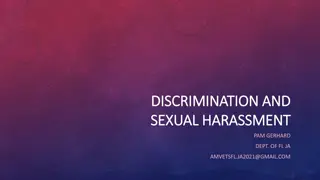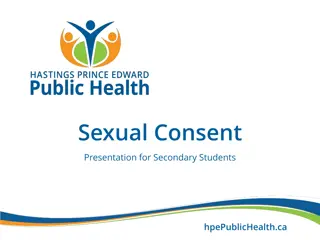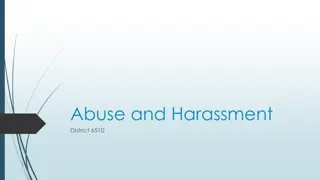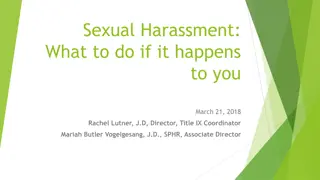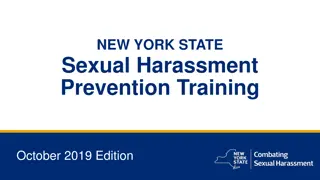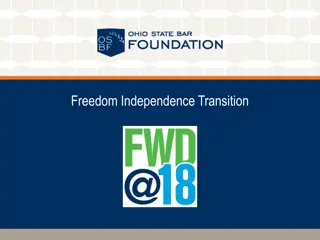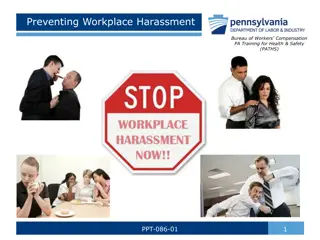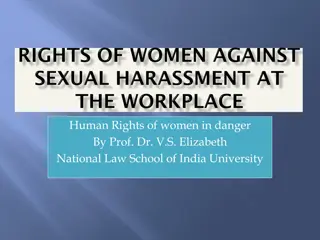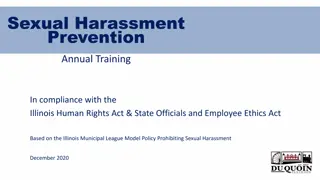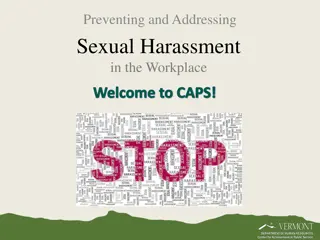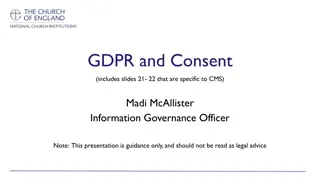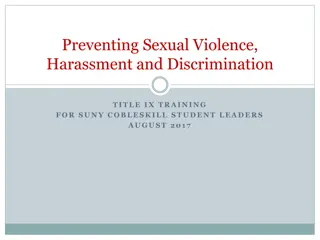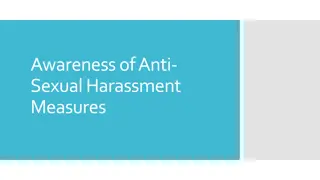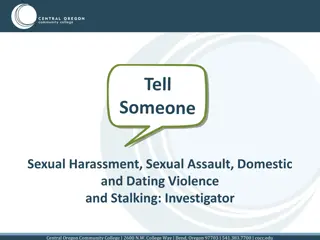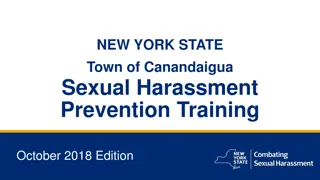Understanding Consent and Addressing Sexual Harassment
This educational material discusses the importance of consent in relationships, sheds light on the prevalence of sexual assault, and delves into the concept of shifting blame away from perpetrators. It emphasizes the need for respecting boundaries and supporting survivors of sexual harassment and violence. The resource also provides insights into the legal definition of consent in the UK and aims to promote a Zero Tolerance culture towards such behaviors.
Download Presentation

Please find below an Image/Link to download the presentation.
The content on the website is provided AS IS for your information and personal use only. It may not be sold, licensed, or shared on other websites without obtaining consent from the author. Download presentation by click this link. If you encounter any issues during the download, it is possible that the publisher has removed the file from their server.
E N D
Presentation Transcript
to sexual harassment and sexual violence Consent it matters
Looking after yourself This information pack on consent has been put together by Student Services as part of a joint campaign with the Students Union to embed a Zero Tolerance culture towards sexual harassment and sexual violence. It should take about 15-20 minutes to work through. If you have had a personal experience of sexual harassment or violence, you may be affected by some of this content. You are free to decide whether you want to go through the slides now, or come back to complete them when you feel ready. Alternatively, you may want to go direct to the last slide, which explains what the University has put in place to support survivors of sexual harassment and violence.
Consent means showing respect We want each and every one of our students to be safe and enjoy healthy, respectful relationships. Giving consent to having sex is an important part of this. "There is no place here for behaviour which undermines the dignity and human rights of other members of the community. None of us should adopt such behaviours, and none of us should accept or condone them. That is why I support and endorse the Zero Tolerance movement here at our university." Professor Peter Slee, Vice Chancellor
Consent why it matters It is estimated that 20% of women (3.4M) and 4% of men (631,000) have experienced some form of sexual assault since the age of 16. During the year ending March 2017 it is estimated that 2% of adults experienced some form of sexual assault. That is 646,000 victims. People aged 16-24 are significantly more likely to be victims of sexual assault 83% of female victims know the perpetrator prior to the offence These figures come from Sexual Offences in England and Wales Crime Survey: year ending March 2017, published by the Office for National Statistics.
Consent what does it mean in practice? The law in the UK defines consent as being given when someone agrees by choice, and has the freedom and capacity to make that choice . Click on the link to watch this video: Whether it s sex or tea, consent is everything
Consent shifting the blame There are factors which some people see as a reason to shift the blame away from the perpetrator and on to the victim. According to the 2013/14 Crime Survey, victims were regarded as completely or partially responsible for the offence by: 33% of respondents (when victims were drunk) 40% (when victims under the influence of drugs) 44% (when victims had been flirting) This graph is taken from: Violent Crime and Sexual Offences - Intimate Personal Violence and Serious Sexual Assault, published by the Office for National Statistics based on findings from the 2013/14 Crime Survey for England and Wales and police recorded crime.
Consent myths v realities The law is clear: having any kind of sex without getting consent is illegal and is rape or sexual assault. Trying to shift the blame will not work. Myth: Anyone under the influence of drugs or alcohol is asking for it Myth: Agreeing to do something sexual means that you have agreed to do everything else as well Myth: If someone was wearing provocative clothing, they are partly to blame. Myth: men can t get raped and women don t sexually assault Reality: Penetration by a penis is rape, and penetration by something else is sexual assault. So men can get raped and women can carry out a sexual assault. Reality: Everyone has the legal right to say no and change their mind at any point. If you don t stop, you are committing sexual assault or rape. Reality: If a person is unconscious or incapacitated, they can t give consent. Having sex with someone in this state is rape. Reality: What someone was wearing when they were raped or how they behave is irrelevant. The blame lies with the perpetrator. Alison Saunders, Head of the Crown Prosecution Service, has said that every defendant accused of rape should always be asked to prove their alleged victim was consenting. Watch this video Myths and Stereotypes about what #ConsentIs and take a look at the Rape Crisis website.
Consent what it is and what it is not Consent is: Communicated explicitly Voluntary Retractable (people can change their minds) Recognition of equality and respect in any kind of sexual encounter or relationship. Consent is not X Something that you can assume is given X Something that someone can give when they are asleep or incapacitated X Something you can coerce or trick someone into X An automatic right if you have been given consent previously, or if you are in a relationship X Taking, sending, or sharing sexual images without someone s agreement The University is committed to providing a high quality learning and teaching experience for all students. This can only be achieved if members of the University community live and work beside each other in an environment which promotes respect. Extract from Expected standards (Leeds Beckett University Student Code of Discipline)
Consent Whats your relationship IQ? Take this quick quiz https://www.disrespectnobody.co.uk/quiz/
Together lets change the culture Thank you for taking the time to look through this important information about consent. If you want to join us and get active in the Zero Tolerance campaign, here is how you can do it. Become an Active Bystander You can help promote a zero tolerance culture by joining the growing number of active bystanders in the University. Being an active bystander is about having the skills to intervene positively and safely in a situation involving sexual harassment or violence. Sign up for the two-hour Bringing in the Bystander session by emailing zerotolerance@leedsbeckett.ac.uk Become a Student Facilitator You can also apply to train as a student facilitator and assist with delivering the Bystander training across our campuses and in the local community. Look at these volunteering opportunities which are offered as part of the Students Union Beckett Award. Take the Pledge Over 1000 individuals, teams and businesses have joined us in Taking the pledge to support the Zero Tolerance campaign.
Support for survivors At Leeds Beckett we do not tolerate sexual harassment and violence in any form, and we are committed to supporting you. If you choose to make a disclosure about an incident, our specially trained staff will handle this sensitively and in confidence. On the Zero Tolerance website, you can find information on the range of support options available to our students within the University and through specialist, external organisations. Whether you have been affected yourself by an incident or know someone who has been, there are places you can choose to go for help whenever you are ready. Leeds Beckett Zero Tolerance Website Here you can: Watch the Zero Tolerance video Report an incident (anonymously if you prefer). Find information about the support available to you.





